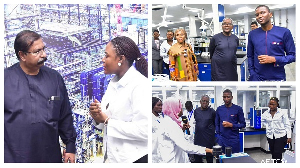 The massive Dangote refinery establishes Nigeria as a major influencer
The massive Dangote refinery establishes Nigeria as a major influencer
The Africa Energy Technology Centre (AETC) has praised Nigeria's Dangote Petroleum Refinery and Petrochemicals as a beacon of hope for Africa's energy security and the petroleum industry.
This comes as Dr. Layi Fatona, the pioneer Managing Director of Niger Delta Exploration & Production Plc, commended the Refinery for restoring Nigeria’s pride and significantly boosting local refining capacity.
Emelia Akumah, the founder and president of AETC, expressed her admiration during a recent visit to the multi-billion-dollar facility while attending the inaugural Crude Oil Refinery-owners Association of Nigeria (CORAN) Summit in Nigeria.
Located in the Lekki Free Zone near Lagos, the Dangote Oil Refinery is the largest oil refinery in Africa and the world's largest single-train facility, with a capacity of 650,000 barrels per day (BPD). Akumah toured the refinery, which represents a significant milestone for Nigeria's energy sector.
Her visit coincided with a tour by Grenadian Prime Minister Dickon Amiss Thomas Mitchell and his entourage, highlighting the global interest in the refinery.
Akumah praised the state-of-the-art technology utilized at the facility, urging Ghana to draw inspiration from Dangote's ambitious project as it aims to establish three refineries, each with a capacity of at least 300,000 BPD, under the proposed Petroleum Hub Project in the Jomoro municipality of the Western Region.
“I am amazed at the enormity of technology employed in the construction of the Dangote Refinery, and Ghana must emulate this example as it prepares to construct three refineries. It was a beautiful experience seeing all the great things they are doing,” Akumah stated
Akumah emphasised the AETC's commitment to promoting the use of advanced technology that minimizes carbon footprints and ensures sustainable operations.
She also extended an invitation to Vice President of the refinery, Edwin Devakumar, to participate in the second edition of the annual Africa Energy Technology Conference in 2025, set to be held in Accra, Ghana.
The AETC aims to advance innovative technological solutions, foster dialogue among policymakers and stakeholders, and create a progressive regulatory framework to enhance the business environment for all industry players within Africa's energy ecosystem.
An advocate for women's involvement in energy, Akumah is driven by her passion for a just energy transition in Africa.
She focuses on empowering women and youth as leaders in the energy sector and currently serves as the Equality Initiative Ambassador for 2022-2024. Recognized as one of Africa’s 50 most inspirational female energy executives at the 30th anniversary of Africa Oil Week, her efforts highlight the need for clean energy access across the continent.
Speaking as the Guest Speaker at the CORAN Gala Dinner, Dr. Fatona emphasised that the refinery represents a transformative step toward reducing Nigeria's reliance on imported fuel.
He asserted that Nigeria's energy security hinges on establishing an efficient energy system that meets the needs of its citizens.
“The commencement of operations at the Dangote Refinery has no doubt become a game-changer in the narratives of the journey towards Nigeria’s energy security and independence,” he stated.
The renowned petroleum geologist commended Aliko Dangote, CEO of Dangote Petroleum Refinery and Petrochemicals, for revitalising Nigeria's energy landscape after nearly three decades of dependence on imported petroleum products.
“I must congratulate this major and bold private initiative by Africa’s most enduring entrepreneur—Alhaji Aliko Dangote. Thank you for bringing pride and that ‘CAN DO SPIRIT’ back to our country,” Dr. Fatona remarked.
He highlighted the importance of the Dangote Refinery and other modular refineries in Nigeria, noting that the country's cumulative refining capacity of approximately 1.3 million barrels per day accounts for about 35% of Africa’s current demand for refined products.
According to the recent OPEC 2024 World Oil Outlook 2050 assessment, the Dangote Refinery is expected to disrupt global trade flows, intensify competition for market share, and reshape gasoline markets in Africa and Latin America.
Dr. Fatona stressed that the refinery will help Nigeria achieve near self-sufficiency in refined products and reduce dependence on imported gasoline from Europe, ultimately benefiting the West African market.
He cautioned, however, that Dangote must be mindful of potential defensive responses from Western refineries as their traditional markets contract due to these changes.
He called for increased collaboration between the government and the private sector to enhance local refining capacity.